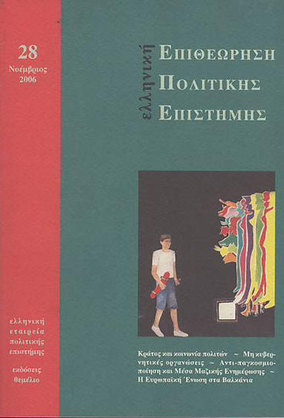Πολυπολικότητα, αναρχία, εθνικό συμφέρον και ευρωπαϊκή ασφάλεια μετά τον Ψυχρό Πόλεμο : μια θεωρητική παρέμβαση
Part of : Ελληνική Επιθεώρηση Πολιτικής Επιστήμης ; No.12, 1998, pages 81-107
Issue:
Pages:
81-107
Parallel Title:
Multipolarity, anarchy, national interest and European security after the Cold War : a theoretical view
Author:
Abstract:
The article discusses the post-cold war problematique of european security. It examines whether the concept of security has changed as a result of the new geopolitical developments in Europe as well as the extent to which the changing systemic conditions have resulted in a need to reapproach international relations theory and foreign policy analysis. The basic argument is that the nature of the new systemic reality, contrary to realist and neorealist predictions, can be condusive to the efforts of the European Union member- states to formulate norms and rules which can promote cooperative state behaviour and advance the integration process in the field of foreign policy and security.The analysis deals with the theoretical debate in the field, and aims at tracing the definitional features of the «new order» in Europe. Concepts like globalization, unit differentiation, multipolarity, anarchy, national interests, roles and identities are examined in an attempt to understand the structure of the regional subsystem in relation to state behaviour and interaction.The transition to a multipolar international system reflects the development of new structural variables which result in revising institutions and state policies and are linked to basic tools of analysis: structure and nature of the system, national interest, state sovereignty and power. Multipolarity impacts heavily upon the issue of power distibution and ad hoc interest de- finion. Although the connection between system structure and foreign policy draws on neorealist analysis, the discussion rejects the deterministic character of the latter because it offers a strict behavioural explanation of process and institutions. The argument is that process and institutions can be instrumental in redefining identities and interests towards a less competitive and essentially nonconflictual European system, especially when - as in the case of the European Union - the negative impact of the anarchical international environment is neutralized by the long-term experience of cooperation and institutional frameworks of normative interaction.
Subject:
Subject (LC):
Keywords:
διεθνείς σχέσεις, εξωτερική πολιτική, διεθνής ασφάλεια
Notes:
Το άρθρο αυτό αποτελεί μέρος μιας ευρύτερης απόπειρας εννοιολογικού επαναπροσδιορισμού του ευρωπαϊκού (υπο)συστήματος., Περιέχει βιβλιογραφία




